Pennywise - Interview
by Anastasia Grabov
published: 25 / 7 / 2005
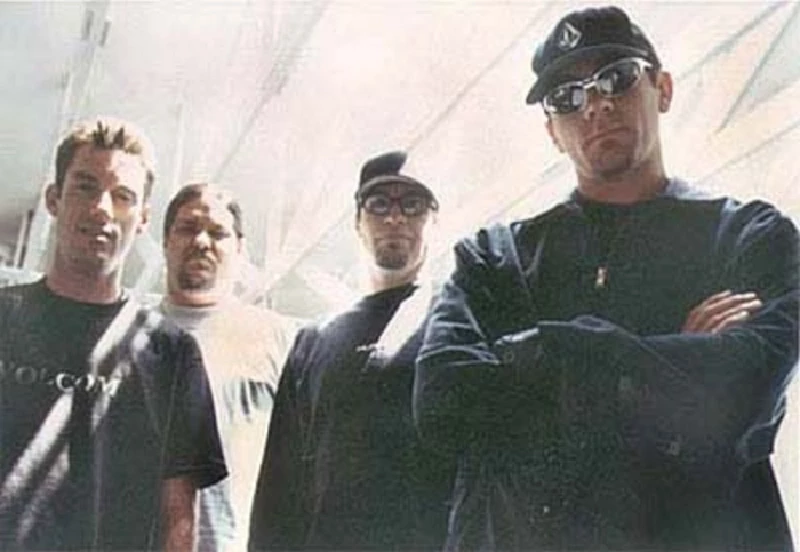
intro
One of the biggest acts on the Epitaph label, Pennywise are currently on a world tour. Guitarist Fletcher Dragge speaks to Anastasia Grabov about his battles with authority, the death of punk rock and what it's really like to "live the dream"
Fans often claim they once made a choice between Bad Religion and Pennywise, and Pennywise won. Why they had to choose is a wonder. But everyone loves to have a favourite. So, Pennywise was born, directly influenced by Bad Religion, citing them as a favourite band, and owing it’s popularity partly to the If-you-like-Bad-Religion-you’ll-love-Pennywise talk that was doing the rounds in the 90's. Not least because Bad Religion’s guitarist Brett Gurewitz signed Pennywise to his own label, Epitaph. Whilst the two names might have gone hand in hand, sharing political ideals and motivations, Pennywise, whose members had all attended the same High School in Hermosa Beach in California, stood out for an optimism in their lyrics, which had failed to show as much prominence in the voices of their peers. Their adrenaline-fuelled catchiness quickly became the soundtrack to many a snowboarding, surfing, and skateboarding trick, and earned the band a dedicated following. In June Jim Lindberg (vocals), Fletcher Dragge (guitar), Byron McMackin (drums), and Randy Bradbury (bass) came to the London Astoria to play to the UK branch of this following. Fletcher Dragge spoke to Pennyblackmusic about his ever-present problems with authority, the death of punk rock, and what it’s really like to "live the dream." PB: How did the band begin? FD: I think it was about 17 years ago. I was 20 or 21. Punk rock was kind of dying out. There wasn’t really anything going on. There were no shows happening. California had a really small scene. I just wanted to start a punk band. I’d been playing in punk bands since 1981. I carpeted the garage, put my amplifier in the corner and just started calling people. I got hold of Jason, then we had Byron and eventually we ran into Jimmy. I know most of these guys form school. We had a different lead singer for a little while. But he wanted to write love songs and we weren’t really into that. When Jimmy got into the band we knew we had it. So we started playing parties. Then recorded our first single and gave copies to our friends at Epitaph. And here we are seventeen years later. PB: Did you find it hard to get onto Epitaph? FD: We gave Brett the single and he called me up saying, “Well, you know, this is pretty good. But I think we’re going to pass on signing you.” At first it was a bummer because we wanted to be on Epitaph. It was the only punk label happening. We really like the sound they were getting when they did recordings. But then we didn’t expect to get signed by them so it wasn’t really that big a let down. Then he called back a couple of days later and said “Do you have any other songs?” We had about fifteen other songs. He said, “Let me hear it!” and he liked it. He asked “What are the rest like?” “They’re all like this.” “Okay, you’re signed!” Back in those days we were talking about selling two or three thousand records. We never thought it would be two or three hundred thousand that we’d sell. It was really cool. It was like a small family when we came down. Brett was the president, producer and engineer. And he was in Bad Religion, one of my favourite bands. PB: How did you chose the name Pennywise? FD: A friend of ours named Steve Martin, who actually did the new record cover, read the book, ‘It’ by Stephen King. He kept saying “Name your band Pennywise, man. That’s what you need to do.” Because Pennywise is this evil thing that preys on your fear and blah blah blah… Ultimately it was about conquering your fears, and a group of kids banding together and conquering this fear that had been scaring them their whole lives. It seemed like a pretty good metaphor for what we were talking about. We were talking about getting your life on track and not giving up. So that was it. Pennywise. He just bugged us until we named the band Pennywise. He wouldn’t shut up about it, so we said “Fine, okay!” But it’s such a stupid name, don’t you think. You know when you hear a band name and think “That’s a stupid name. That band’s never going to do well.” Pearl Jam? Limp Bizkit? Red Hot Chili Peppers? Stupid names! Think about! The Doors is a cool name. Black Flag is a cool name. The Dead Kennedys is a cool name. Pennywise? People are like “Poundfoolish? What?” But the band makes the name. Eventually. PB: Where did you get the inspiration from for your songs? FD: Just daily life. We live in a really nice community, a beach community. But there’s a lot of problems. I mean a lot of gangs, drugs, and alcoholism. It’s a big party town. Growing up being into punk rock at an early age was really destructive. There was a lot of drugs, just real craziness, in which people didn’t care whether they lived or died. The attitude was “Fuck everything!” We wanted to inspire kids to take a different approach; to try and get their lives on track and conquer problems and fears. We started writing songs with words like “Live for the day…” or “Wouldn’t it be nice...” It kind of caught on and then helped us because then we started believing our lyrics. We took to working harder and all of a sudden we realised ‘Whoa! We’re making a living out of playing in a punk rock band!’ It was pretty incredible. So, that was the main inspiration. We wanted to have a better life, and do things the way we wanted to do them. And then later on, politics became more inspirational. PB: You had a song called ‘Fuck Authority.’ Is that something that still rings true today? FD: Oh yeah. For sure. Still getting into trouble with the police all the time. Or hopefully not too much. There’s this huge police corruption problem in Los Angeles. The police in America are doing a lot of bad things. If you’ve ever seen a movie like ‘Training Day,’ that’s really how it is, and it’s based on the truth. There’s a lot of people who are in a huge position of power, and who abuse their authority. I’ve always had a huge problem with authority, especially the police. If you were a punk rock kid they were always after you. I think it’s still true today. I think I’ve been arrested thirty-six times. I’d rather not get into trouble but when I know something’s unjust or corrupt it gets me mad. PB: So, you started off with local problems such as police and then moved onto bigger aspects of politics? FD: Yeah, we started off on personal politics, wanting to make our lives better. We wrote about those that had control over our lives, such as the police. We had a song called ‘Starky.’ It was about a cop in our hometown who raped a girl whilst she was in prison. As we got older we got more and more aware of this kind of thing. We were travelling on tour, thinking ‘Why is it so cool in Europe? Why can you smoke weed in Amsterdam? Why is it so much more mellow?’ Less violence and no guns on the street. Then we started getting annoyed with our government and the way it runs itself. We started getting really political on ‘Land Of The Free.’ Then 9/11 happened. We got even more pissed off, and so ‘The Ashes’ was quite political. I think in the new album we got some politics, but have also gone back to the old-school way of thinking; that you’ve got to change yourself. Every little bit helps to try and change people’s opinions but I think this time we’re trying to spark people’s imaginations; to try and look within and be stronger as themselves and then hopefully that would influence other people and carry on through life. We’ve been yelling shit for so long it’s almost frustrating now. There’s a few songs on the album that are a little bit more depressing. They’re about feeling like you’ve got everything, and then poof! It’s taken away from you. As we get older there’s a bit of everything in our records. PB: Do you think you are more philosophical than political? FD : I think it’s easy to say, “Pennywise, man, they’re so political.” We may be a political punk band but if you look deeper into the lyrics you’ll find multiple meanings. It’s not necessarily about politics. There’s a lot of dreams of having a better world. It sounds kind of corny, especially coming from a big ugly guy like me, but it’s about having a world where there’s no violence, no drug addiction, and no starvation. It’s not always about the police, but about your parents, your boss, about anything in your life where someone’s telling you what to do and you don’t want to do it. The most important part of Pennywise is the spirit of the band and the lyrics. It’s like a way of life, a religion almost. Well, that might be pushing it a bit! But we have kids coming up to us and saying, “You changed my life!” We open people’s minds to thinking about the power that they have. There’s really only one way you can change things, and that’s to change yourself. You can try to change others but the best way is to change your way of thinking and your way of acting. So, I definitely agree it’s more philosophical. PB: Do all the band members share the same way of thinking? FD: Pretty much. There’s some differences of opinion, especially on religion. Politically wise, everyone is pretty much on the same page. What’s going on in our neighbourhood is wrong 90% of the time. It’s not hard to think the same way. I’m definitely a little more edgy. My attitude is ‘Fuck the Police’, throw rocks at cops and get into fights with them. Jim’s the more philosophical guy. He does a lot of reading, and knows everything. I’m more the street thug. It’s a mix of personalities. When all that comes together, it becomes Pennywise. It’s a chemistry. When you look at bands like Guns’n’Roses, Rage Against The Machine, The Rolling Stones, or Pantera, there’s this energy that sets them apart from other bands. Or you can have a perfectly good band like U2 or Blink 182. They’re writing a bunch of pop songs, they’re great bands, play good music, whatever. It’s not my personal favourite but you don’t really see that chemistry. Not the chemistry you get when you go see someone like Pantera. Or Guns’n’Roses, when Axl’s late and everyone’s pissed off, but then they start playing and it’s like ‘Wow.’ It all comes together. I think Pennywise has that fortunate blessing of completely different personalities you can mix together. It just works. PB: Has being together for such a long time made you closer or created more friction between you? FD: There’s a lot of friction, trust me. There’s friction one year about this, and then friction another year over that. It changes. This year there was a lot of friction about making our latest record ('The Fuse'-Ed). But that’s what Pennywise is about; getting past the friction, getting past the problems, and getting to the solution. Writing this record was a bit of a hell ride. PB: Is writing never fun? FD: Not once. I mean, the first time it was fun. But that’s because all we were trying to do was have fun. We didn’t care if we were successful or not. We didn’t have any expectations. We were just writing songs. And now we’re under pressure to sell records. You have fans that are waiting to judge you. The song writing has gotten to the point where it’s very volatile. It’s not just one guy. It’s everybody coming in with their ideas and trying to shove it all into one song. PB: Do you think song writing has now become more forced than spontaneous? FD: No, it’s not forced at all. Everyone’s really passionate about it. Jimmy’s like “Here’s 28 songs.” I’m like “Okay, here’s 12.” Randy says “16.” Then we’re all like “Okay, how do we pick them?” “I really like this song that I wrote.” “I don’t like it.” “What’s wrong with you? Are you crazy?” “I just don’t like the song. I don’t want to sing it.” Imagine having to sort out 50 songs. Everybody has to like the songs. Four people have to like the songs. Four people have to like the record covers. Four people have to like the lyrics. Four people have to like the T-shirts. I mean everyone has to approve the fucking colours on the T-shirts. We’ve done everything ourselves for so long it’s like a democracy. That’s really really hard. It’s not like the song-writing is forced at all. There’s way too many songs. Probably for this album we had 60 songs. There’s usually 40 to 50 songs for every album we do. We could have done an extra 10 albums by now. We could pull out 10 records worth of archived material and distribute them out. So, it’s not forced at all. It’s a force to get 14, 15 songs on one CD. That’s the hard part. PB: Are all the songs you pick agreed for by all of you? FD: Yeah. Although there might be a couple that aren’t. I know that there’s a song on this album that Jim doesn’t like that much. But a lot of other people like it. So, sometimes you have to give a little bit. I almost tried to come up with a policy where everyone got to pick at least one song that has to go on the album. It doesn’t matter what anyone else says. We didn’t actually use that but that what I wanted. But they are pretty much agreed for by all of us. It’s a voting process. It’s not fun. Trust me. PB: What do you think about the punk scene now? FD: There is no punk scene. What are you talking about? Punk rock’s dead. It’s been dead for ages now. Blink 182. Good Charlotte. Yellowcard. I mean, a punk band that signs with a major label no longer has the right to call itself punk. Punk rock is anti-establishment, anti-corporate. How can you call yourself a punk band and be signed to a major label? How can you be on Teen Beat magazine, and do shows with Pink… No, Pink’s cool. Let me take that back. Do shows with Britney Spears. Punk rock is about rebellion and danger. A lot of it started over here [London] in the late 70's. It wasn’t cool to be punk rock. It was totally uncool. People were like “You fucking punk rock piece of shit.” And that was the cool thing. You could walk around and be hated by everybody. Because you didn’t feel like you could fit in with the normal people of society. You felt like you were part of a group in which you could belong. Now it’s okay to have a mohawk, spiky wrist-band and green hair. Now it’s normal. So how can punk rock exist if its normal? Because punk rock was about being abnormal. So, there’s no such thing as punk rock. Punk rock has to come from within the person. I mean, I know people that are hippies, that are more punk rock than a so-called punk rocker. I wouldn’t even call Pennywise a punk rock band. We’re just a band that plays music that has a punk attitude. PB: Do you think Epitaph have changed quite a lot as well? FD: I think they’ve changed a little bit. They were putting out punk rock only in their early years. And I think Brett saw how the punk scene began overflowing with too many bands. How many punk bands are there now? 200,000 ? I mean everyone knows someone in a punk band. Every single kid on every street seems to be in a band. I think Brett had the insight to start experimenting with some different types of music. If you think about it he signed The Hives. There’s a band that should be bigger than they are. They went to a major label of course, like everybody else does, to earn a bunch of money. I heard they got a lot, like ten million dollars, or something like that. I guess they get to retire in peace and quiet, and sleep. But Brett signed a lot of really good bands and I think it’s okay for him to diversify, opening up some different avenues for music. It would have been cool if it had remained a strictly punk rock label the whole time. But punk rock got to the point where it was kind of played out. There are too many bands doing it. To not explore different avenues would be shooting himself in the foot. PB: He has signed a lot of Hip Hop artists. Isn’t he going in the opposite direction of punk? FD: No. Hip Hop is totally punk. Okay, let me rephrase that. MBA was totally punk. Ice Cube was totally punk. Dr Dre was totally punk. MC Hammer was not punk. A lot of the bands you see today are not punk. But 50 Cent is totally fucking punk. There’s different ways to look at punk. MBA or gangster rap, or hardcore rap artists like 2Pac are punk rock. Their attitude is. Even though they’re singing a totally different kind of lyric, and they have different style of sound, their attitude is punk. It’s pretty much a “Fuck you society. I’m going to do what I want to do.” I think signing rap artists is punk rock for Brett to do that. Punk Rock is how you conduct yourself. And Sage Francis –his lyrics are totally punk rock. I listen to rap all the time. I listen to Ice Cube and MBA. I like the shit. I don’t think it has a very positive effect on teenagers. But I’m an adult and I can decide if someone’s kidding around or what not. I think it’s cool that he’s done that. PB: Do you think he’s trying to appeal more to the mainstream? FD: I think anybody that has a record label has at some point tried to appeal to the mainstream because they want to sell records. But at the same time he has a lot of bands that don’t sell a lot of records. They’re not going to make him rich. He just puts it out because he likes it. I just think he does as he likes. Which is punk rock. He makes up his own rules as he goes. PB: Would you sign to a mainstream record label? FD: Absolutely not! In Pennywise at least, maybe punk rock is not yet dead.
Picture Gallery:-
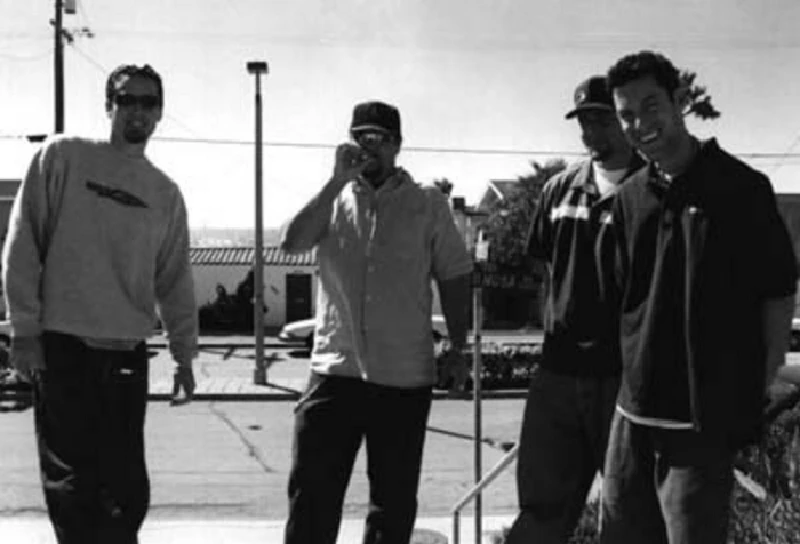
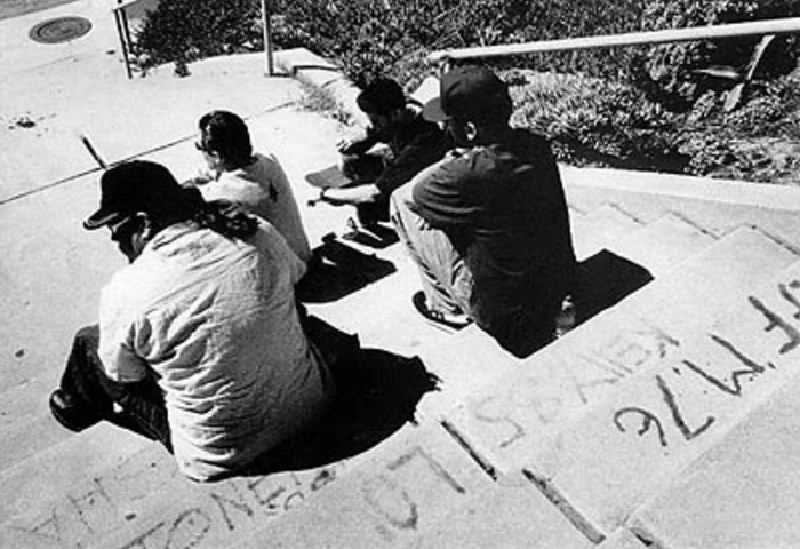
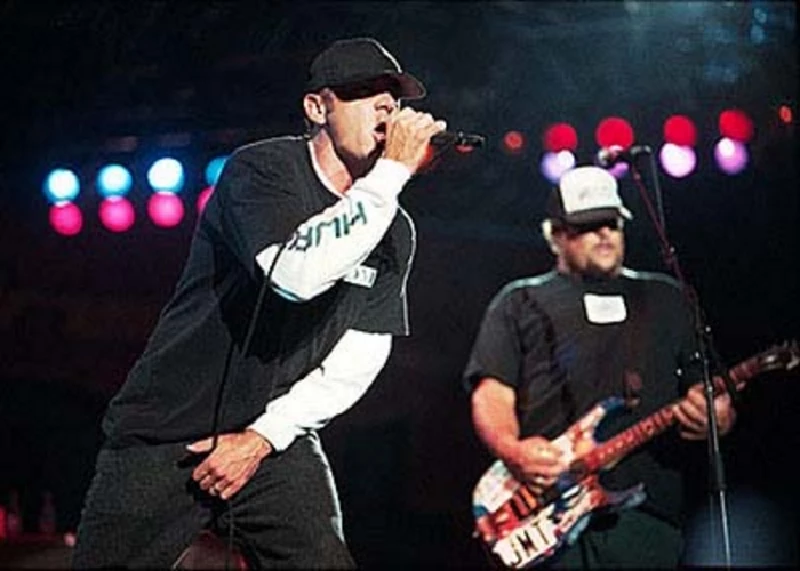
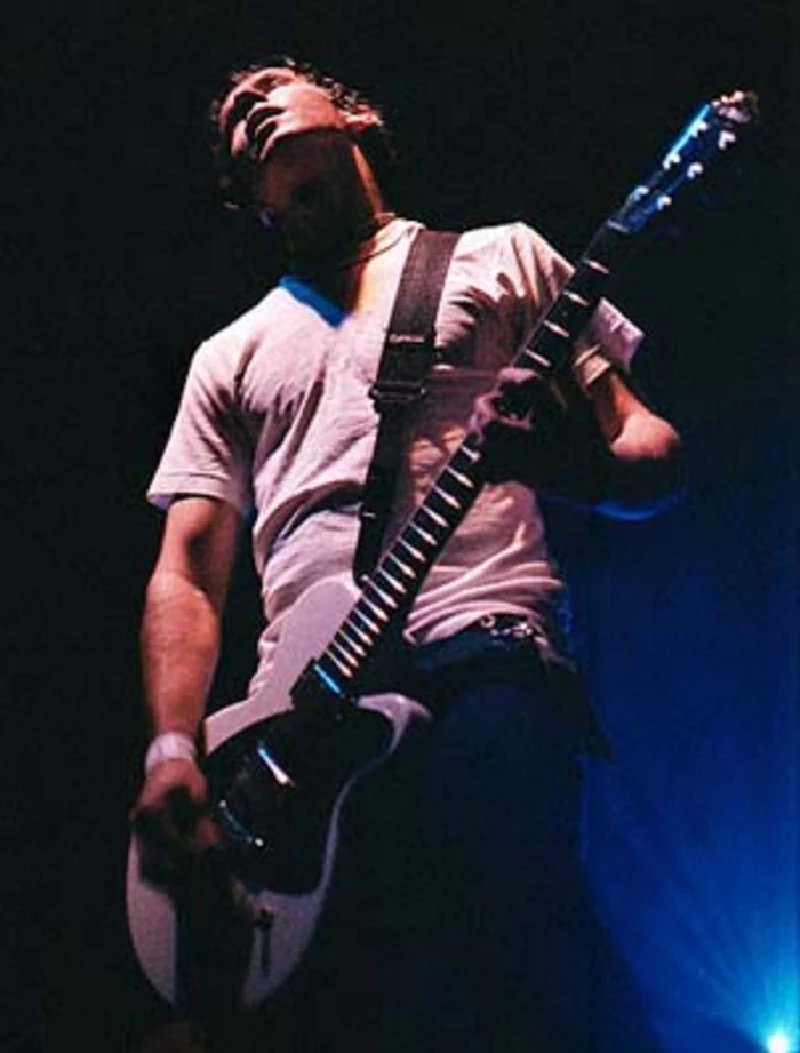
live reviews |
|
Brixton Academy, London, 6/6/2004 |
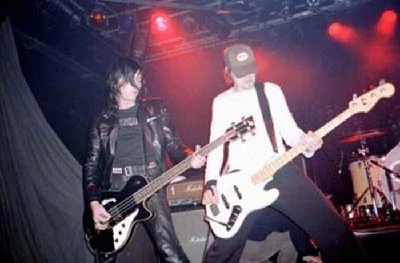
|
| At London's Deconstruction Festival, Philip Vincent finds himself reconverted to punk after watching sets from the likes of Pennywise, MxPx., Anti-Flag, the Slackers and the Beatsteaks |
reviews |
|
From The Ashes (2003) |
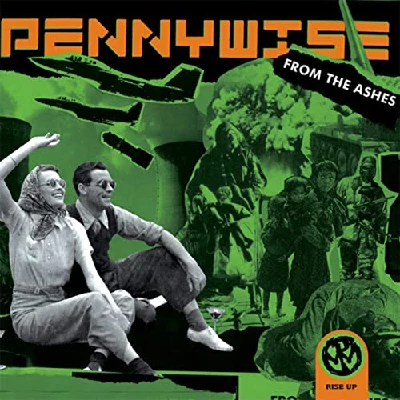
|
| Earnest eighth album from passionate Californian punk rockers Pennywise, that proves to be a return to form |
most viewed articles
current edition
Carl Ewens - David Bowie 1964 to 1982 On Track: Every Album, Every SongArmory Show - Interview with Richard Jobson
John McKay - Interview
Colin Blunstone - Thalia Hall, Chicago, 16/7/2025
Billie Eilish - O2 Arena, London, 10/7/2025
Bathers - Photoscapes 1
Loft - Interview
Visor Fest - Valencia, Spain, 26/9/2025...27/9/2025
Sir Tim Rice - Interview
Robert Forster - Interview
previous editions
Manic Street Preachers - (Gig of a Lifetime) Millennium Stadium, Cardiff, December 1999Heavenly - P.U.N.K. Girl EP
Beautiful South - Ten Songs That Made Me Love...
Oasis - Oasis, Earl's Court, London, 1995
Peter Perrett - In Dreams Begin Responsibilities Interview Part One
Boomtown Rats - Ten Songs That Made Me Love....
Coldplay - Wembley Arena. London, 16/8/2022
Prolapse - Interview
Pixies - Ten Songs That Made Me Love...
Trudie Myerscough-Harris - Interview
most viewed reviews
current edition
Davey Woodward - Mumbo in the JumboSick Man of Europe - The Sick Man of Europe
Lucy Spraggan - Other Sides of the Moon
Amy Macdonald - Is This What You've Been Waiting For?
Phew, Erika Kobayashi,, Dieter Moebius - Radium Girls
Suzanne Vega - Flying With Angels
Bush - I Beat Loneliness
Alice Cooper - The Revenge of Alice Cooper
Cynthia Erivo - I Forgive You
Blueboy - 2
Pennyblackmusic Regular Contributors
Adrian Janes
Amanda J. Window
Andrew Twambley
Anthony Dhanendran
Benjamin Howarth
Cila Warncke
Daniel Cressey
Darren Aston
Dastardly
Dave Goodwin
Denzil Watson
Dominic B. Simpson
Eoghan Lyng
Fiona Hutchings
Harry Sherriff
Helen Tipping
Jamie Rowland
John Clarkson
Julie Cruickshank
Kimberly Bright
Lisa Torem
Maarten Schiethart